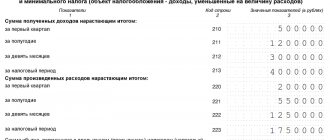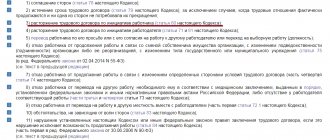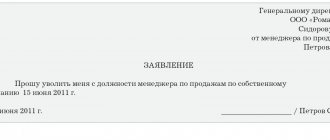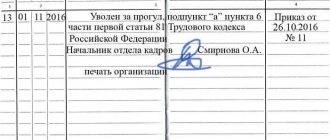Home / Labor Law / Dismissal and layoffs / Dismissal
Back
Published: 04/04/2016
Reading time: 9 min
0
1721
Like many other aspects of labor activity, the grounds and procedure for dismissal are regulated by the Labor Code of the Russian Federation. In particular, Art. 81 of the Labor Code of the Russian Federation is devoted to the issues of termination of an employment contract at the initiative of the employer.
Since in this case the rights and interests of the employee may be affected, it is necessary to strictly comply with the requirements of the law. It is worth considering in more detail the legal grounds for terminating an employment contract and the rules for carrying out this procedure.
- Grounds for termination of cooperation
- Cases in which termination of an employment contract is not permitted
- Conditions and procedure for termination of the contract
Under what article is dismissal initiated by the employer?
Unlike a hired employee, who, in accordance with the text of Article 80 of the Labor Code of the Russian Federation, can demand termination of the employment agreement at any time and, having worked the required two weeks, receive a payment, the management of the organization, when dismissing an employee, is obliged to indicate a specific reason. The grounds for terminating an employment contract initiated by the employer are listed in Article 81 of the Labor Code of the Russian Federation. It is not by chance that the grounds are enshrined in law.
Information
In the “employee-employer” tandem, the first is a priori considered the more vulnerable party. Therefore, reflection in the Labor Code of the main reasons for dismissal is a universal protection of the interests of hired employees.
Grounds for dismissal
The inability to continue cooperation with an employee may be dictated by his misconduct or some objective reasons. Therefore, he can be dismissed for one of 2 reasons: for guilty actions or in connection with circumstances not related to the fault of the dismissed person. Let us briefly consider the legal grounds for terminating an employment contract for each of these two categories.
No fault of the employee
An employer can say goodbye to an employee who has not committed any punishable offenses if:
- The organization ceases to exist or the individual entrepreneur is no longer engaged in entrepreneurial activities. In such cases, all employees are dismissed, including those to whom the law provides special guarantees.
- The workforce is being reduced. The most qualified employees who demonstrate maximum productivity have the priority right to retain their positions. It is impossible to deprive citizens of their jobs who are dependent on at least 2 people, who are the only employed family members, who received an occupational disease or work-related injury at this enterprise, disabled people from the Great Patriotic War or other combat operations, and people working to improve their skills. In addition, inventors and those who first got a job after completing military service and spouses of military personnel have an advantage (in accordance with the laws on inventions and the status of military personnel). An agreement with a minor can be terminated only after receiving permission from the labor inspectorate and the commission for minors.
- The organization's property has passed to another owner. Only the manager, his deputies and the chief accountant can lose their job when the owner changes; other employees cannot be fired in this way. The new owner of the organization is authorized to terminate cooperation with the above-mentioned persons no later than within 3 months from the date of transfer of ownership. If the jurisdiction of the company was changed, but the owner remained the same, there are no grounds for changing management employees.
- The employee is found to be unsuitable for the position he occupies. This means that he does not have the qualifications required to properly perform his official duties. The fact of non-compliance is determined according to the results obtained during certification.
- It was recognized that the person accepted into the organization did not pass the test prescribed in accordance with the conditions agreed upon in advance.
- There are other grounds determined by federal legislation or arising from the clauses of the contract. For example, the contract may contain a ban on part-time work.
For guilty actions
Guilty actions mean the commission of illegal acts or disciplinary offenses by a citizen. These are:
- Repeated failure by an employee to perform his official functions after being subjected to disciplinary action (taken into account only if the reason is not valid). Disciplinary liability is taken into account within a year from the moment it is imposed on the offender.
- The employee committed a gross misconduct. The management of the organization has the right to say goodbye to him after the first such violation has been committed. The legislator provides a list of them in the Labor Code:
a) Walking. The offender is absent for more than 4 hours in a row.
b) Coming to work drunk or driving yourself to an intoxicated state during working hours. This applies to all types of intoxication associated with taking any substances - it can be alcoholic, narcotic or toxic.
c) Disclosure of information the disclosure of which is unacceptable.
d) Committing at work theft (including petty) of the property of the organization or any other person or damaging it with intent, as well as embezzlement. The fact of an offense can be confirmed by a court verdict or a resolution of another authorized body. To identify theft, you can contact the private detective agency https://shpion.su/agency, which are located in any big city.
e) Failure to comply with labor safety rules, which led to serious consequences or significantly increased their likelihood.
- Loss of trust in an employee who works with money or commodity values, due to his guilt. If the fact of theft or bribery is proven, the perpetrators may be dismissed even in situations where their illegal acts are not directly related to the performance of professional tasks.
- The employee did not take the measures necessary to prevent or resolve a conflict of interest to which he belongs to one of the parties, or did not provide fully reliable data regarding personal income and expenses. The Labor Code of the Russian Federation does not indicate to which persons this provision should be applied, however, an analysis of judicial practice shows that it almost always applies to citizens in state or municipal service.
- Identification of the fact of immoral behavior of a person endowed with educational functions (educator, teacher). And it is not a decisive factor whether the immoral acts were committed at the place of work or outside it. If actions that raise doubts about the moral qualities of the person who committed them took place on the territory of the organization, were recorded directly in the organization, when taking measures against the offender, the employer should be guided by the procedure for applying penalties established by the Labor Code of the Russian Federation. When immoral behavior was noted outside the organization, the person who committed it can be dismissed no later than 1 year after the employer receives confirmation of this information.
- A senior employee of an organization (including a representative office or branch) made an unfounded decision that caused damage to the organization’s property or caused its unlawful use. In such a situation, only the manager, his deputies and the chief accountant can be dismissed. When deciding the fate of these employees, it is necessary to determine whether such consequences would have occurred if management had made a different decision.
- The manager or his deputy grossly violated his duties. The fact of the occurrence of negative consequences should not be taken into account here.
- The person applying for a job presented false documentation to the organization. These include both completely invalid documents and those with one or more falsified elements (for example, an invalid form or a forged signature).
The last provision can be classified as guilty grounds conditionally, since from the point of view of the law it does not matter whether the candidate for a vacant position is guilty of providing false documents.
Liquidation of an organization
The procedure for closing an organization is defined in Articles 61-63 of the Civil Code of the Russian Federation. The grounds for liquidating a company are outlined in Article 61 of the Civil Code of the Russian Federation. They act as:
- Judgment;
- The decision made by the founders of the enterprise.
When a company closes, all workers lose their jobs. However, in this case, employees have certain guarantees, since the law specifies that dismissed employees should be the first to receive a payment with compensation for days worked.
Grounds for dismissal from office
The Labor Code of the Russian Federation provides a number of grounds on which an employee is relieved of his position. Article 81 lists various options when an employer has the right to forcibly remove an employee from the workforce. However, the prerequisites for this are not always inappropriate behavior or repeated failure to fulfill assigned duties.
The legislation identifies clauses that can apply to all personnel, as well as clauses in relation to specific positions.
In addition, the list of grounds is presented in two groups:
- dismissal related to the employee himself;
- suspension from work not related to a person's actions.
The direct guilt of a person is considered to be his behavior, a fully conscious act that is contrary to the law and labor discipline. As a result, management has the right to dismiss an employee for improper performance of his duties without any additional serious reasons. The behavior and responsibilities of personnel are specified in the contract, as well as in the company’s internal labor regulations. The following are considered violations:
- absenteeism and absence from work (systematic or one-time);
- performance of official functions in a state of narcotic, toxic or alcoholic intoxication;
- consumption of any alcoholic beverages during the working day on the territory of the enterprise;
- embezzlement, theft of property, as well as its intentional damage and destruction;
- violation of safety rules (if the consequence was a man-made accident, accident, catastrophe);
- forgery of documentation;
- making an inappropriate decision by a manager, which resulted in a material loss to the company (deputies, accountant);
- disclosure of industrial secrets.
The employer may decide to dismiss for improper performance of job duties both during the probationary period and after a decade of work at the enterprise.
Each case must be considered separately, and the decision must comply with the requirements of the law and the severity of the subordinate's misconduct.
Reduction
At the initiative of the employer, the list of places at the enterprise may be reduced. Employees holding positions are subject to calculation. In this case, dismissal is carried out according to a certain gradation: first of all, employees with the least qualifications and productivity among those occupying a certain position, for example, managers, are removed from the workplace. But if workers are equal according to these criteria, then Article 179 of the Labor Code of the Russian Federation establishes a preferential right to retain a place for the following categories:
- Persons with more than two dependents;
- Breadwinners are the only ones receiving income in the family;
- Employees who were injured during their work in this company;
- Disabled combatants and WWII;
- Employees undergoing advanced training conducted at the initiative of the employer.
Limiting Factors
Labor rules and functional responsibilities must be specified in the employment agreement with the employee, job description and internal local act, which the hired personnel are familiar with upon signature. Limitations include compliance with labor law standards when assessing qualifications, belonging to a certain category by status or age criterion.
Preemptive right
Reducing the number of candidates when selecting candidates requires giving priority to retaining a place of employment to persons with higher professionalism (Article 179 of the Labor Code of the Russian Federation). If qualification level and labor productivity are equal, preference is given to employees:
- supporting two or more disabled dependents;
- the sole breadwinner of the family;
- who received an occupational disease from a given business entity;
- those who took part in hostilities;
- increasing the qualification level in the direction of the organization in a non-production mode.
A business entity, by means of a collective agreement, can establish additional categories of persons who have priority for maintaining a job with equal qualifications. However, practical comparisons are difficult. How to evaluate the professionalism of an ordinary employee holding an unremarkable position and compare it with a similar employee?
For example, an “exhausted” pensioner can prove his qualification level by having unnecessary experience, without giving a young promising employee “room to take a step forward.”
Category of citizens
In addition to qualifications, the status of citizens is a limiting factor. Thus, separation from a pregnant woman on the initiative of management is possible only:
- at the final stage of liquidation of an enterprise or termination of the activities of an individual entrepreneur;
- upon refusal of the provided vacancy list in case of replacement and early exit from maternity leave of a permanent employee;
- in case of absolute professional incompetence based on the conclusion of a medical organization.
In addition to the above reasons, proven guilt of theft or embezzlement, as well as gross violation of labor discipline, make it possible to terminate legal relations with the following categories of citizens:
- single parents raising children under 14 years of age;
- mothers of many children with at least three children under 12 years of age;
- women who have a child under three years of age;
- parents and persons performing their functions in relation to disabled people under 18 years of age.
The dismissal of minors for any reason requires the written consent of the guardianship and trusteeship authorities.
The pension reform introduced additional sanctions for the illegal dismissal of pre-retirees - persons who have less than five years left until retirement. Law No. 352-FZ of October 3, 2018, which entered into force on October 14, 2018, introduced a new article 144.1 into the Criminal Code of the Russian Federation for violation of rights in the form of a fine in the amount of 200 thousand rubles or forced labor for 360 hours. An unjustified break in cooperation with a person of this category is classified as a criminal offense.
Compliance with regulations
Dismissal must be preceded by compliance with the procedure. For example, if the reason for termination of the employment agreement is a disciplinary offense, then the following actions must be taken (Article 193 of the Labor Code of the Russian Federation):
- provide two working days for explanations to the offending employee, and record the refusal in an act;
- dismiss from his position no later than 30 days after the discovery of the misconduct;
- exclude from the calculation the period of time spent on sick leave and on leaves of all types.
The employee’s refusal to explain and state the reasons for what he did is not an obstacle to dismissal , however, the absence of an offer from the employer or the missed deadline may deem the procedure for terminating the contract illegal.
The dismissal initiative coming from the employer requires notification and direct participation of the elected activists of the trade union organization, if any. The decision on reduction must be submitted for approval in writing no later than two months before the upcoming event (Article 82 of the Labor Code of the Russian Federation).
To make the dismissal legal, the employer must compare the grounds with the status in terms of established restrictions, and carry out the procedure in strict compliance with the regulations. Otherwise, the “offended employee” may be reinstated by the court for non-compliance with labor laws, which automatically takes the side of the hired personnel, considering them the most “vulnerable” category compared to the employer.
Employee mismatch for position
If an employee does not have the skills necessary to work in the given position, he may also be subject to dismissal. However, before signing an order in accordance with which the employee will be calculated, the employer must convene a commission to conduct certification designed to confirm the incompetence of the employee.
For your information:
The inspection is usually carried out once a year, however, if insufficient knowledge or defects in work are detected, it can be initiated ahead of schedule.
Appearing drunk
The employer must take into account that intoxication, although common, does not always occur due to alcohol consumption. An employee may come to work while under the influence of narcotic or toxic substances. In order for a decision to punish an employee to be considered justified, his intoxication must be confirmed by a medical examination ; the presence of external signs in this case is not enough.
Having received the results of the examination, the employer can decide to admit the specialist to production activities or to remove him from work. It must be taken into account that the permitted dose is 0.5 ppm of alcohol in the blood per 80 kg of weight, that is, a person cannot be fired at this level. If the value established by the examination exceeds the permissible value, then the manager must act in accordance with the law.
An employer has no right to force an employee to undergo an examination. At the same time, although a specialist’s refusal to perform a procedure may be an indirect confirmation of intoxication, it still cannot be considered a basis for dismissal. Thus, it is difficult to terminate an employment contract due to such a violation, since strong evidence is required for the legal process to be carried out.
Gross violation of labor duties
The category of gross violations according to Article 81 of the Labor Code of the Russian Federation includes:
- Failure to maintain secrets protected by law;
- Absenteeism;
- Direct violation of established labor protection rules;
- Appearing at the workplace in a state of intoxication with alcohol or drugs;
- Causing damage to property of the institution that does not belong to the employee, its appropriation, embezzlement.
Attention
When such violations are recorded, the law allows the employer to immediately pay the employee.
Common mistakes
If we talk about typical mistakes when abbreviating, these include:
- absence (non-delivery) of notice of reduction;
- dismissal of an employee before the two-month notice period;
- failure to notify employment authorities and the trade union (if any) within the established time limits;
- failure to offer vacancies when available.
When it comes to reducing the number of employees, a fairly common mistake is failure to conduct or incorrect assessment of the preemptive right (Article 179 of the Labor Code of the Russian Federation). For example, employers often have no criteria for assessing labor productivity and qualifications at all, or these criteria are recognized by the courts as subjective.
Other reasons
In addition to the above reasons, an employer may dismiss on the following grounds:
- Change of owner of the organization’s property;
- Guilty actions of an employee involved in servicing valuables or money turnover, leading to loss of trust;
- Amoral behavior;
- Providing false information and documents;
- An unjustified decision of a manager or other official, as a result of which damage was caused to the property values of the company or its branch;
Some other reasons for dismissing an employee are also reflected in other provisions of labor legislation. An additional list is established by Articles 71, 278, 312.5, 336 of the Labor Code of the Russian Federation.
For your information:
Also, other actions leading to dismissal may be indicated directly in the employment contract.
Theft of property
In order to fire a person on this basis, the fact of theft must be proven. The legislation regulating labor relations establishes that for the theft of property of the organization, colleagues or third parties located on the territory of the enterprise, the employee bears administrative responsibility.
The reasons for his dismissal are:
- The material damage caused does not exceed the average monthly salary of a specialist. If this circumstance is confirmed by the conclusion of an independent examination, then, in accordance with the order of the manager, the amount of damage is withheld from the violator’s salary.
- According to expert assessment, the amount of property damage caused exceeds the average monthly salary of the employee. Having received the expert's opinion, the employer must apply to the judicial authority with a statement of claim against the official. Based on a court decision to collect compensation from the specialist’s monthly income, a certain amount will be withheld until the damage is paid in full.
- Through the fault of the employee, the employer lost the organization's property, which had an impact on the cost of production. For example, the specialist did not turn off the shut-off valve, which caused a large water leak. If the employee’s guilty actions are proven, the incident is considered a loss of material assets.
- An incident of theft or an employee’s refusal to comply with the manager’s reasonable demands caused damage to the property of the enterprise. Such behavior is grounds for termination of the relationship, but the law leaves the decision to apply disciplinary punishment at the discretion of the employer.
Despite the fact that theft refers to gross violations of labor discipline under the Labor Code of the Russian Federation, Article 81 applies only in cases where the employee’s guilt is established by a court verdict. This interpretation of the norm is given in the comments to the legal act.
The procedure for dismissing an employee at the initiative of the employer
In order for the employee calculation procedure to be considered justified, the employer must comply with the requirements of the law and consistently complete all stages of dismissal.
Preparation of necessary documents
Dismissal must be confirmed by an appropriate document. Depending on the dismissal of an employee from a position, the following documents may be used:
| Reason for dismissal | Document being drawn up |
| Closing a business | Decision of a judicial authority or board of founders |
| Position mismatch | Protocol reflecting the decision made by the certification commission |
| Staff reduction | Manager's order |
| Failure to fulfill official duties | An order for disciplinary action, or a Representation written by the immediate director of the enterprise |
| Change of company owner | Certificate confirming amendments to the registration papers of the organization |
| Being intoxicated at work | Inspection protocol and violation report |
| Absenteeism | Certificate of absence |
| Disclosure of secrets | Protocol of internal investigation |
| Loss of trust | Judgment |
| Damage to company property or its waste | An audit report drawn up by the tax service |
| Immoral behavior, theft of property | Act on the commission of an act that entailed administrative liability |
Issuance of an order
Based on a document explaining why the employee is leaving, an order is issued to pay the employee. The paper is drawn up in accordance with the mandatory form adopted by the Government of the Russian Federation - No. T-8. If we are talking about the calculation of several employees, an order drawn up according to template No. T-8(a) is used. The document includes:
- Full name of the head;
- Company details;
- Information about the employee;
- Reason for calculation;
- Date of preparation.
Attention
The order is certified by the signature of the immediate director of the organization or his authorized representative.
Registration of an order
The completed dismissal document is transferred to the HR department of the enterprise. Its details are entered into a special accounting book. A copy is made of the paper and placed in the personal file of the dismissed employee. Another copy of the document can be provided directly to the employee.
Familiarization of the employee with the order
Article 84.1 of the Labor Code of the Russian Federation contains a provision on the mandatory provision of a dismissal order to the employee for review. In this case, the latter must sign and indicate the date of reading the paper.
If the employee ignores the need to sign the order, or his whereabouts are unknown, a corresponding mark is placed on the paper.
Important
If the employee does not agree to endorse the document, then a written refusal is drawn up, which is certified directly by the person being dismissed and three witnesses.
Formation of a note-calculation
Upon dismissal, the employee claims to receive compensation payments for the unused vacation period, as well as sick leave. They are calculated on the basis of a special calculation note, which reflects unpaid days or additional time that needs to be worked.
Direct employee payment
On the day of official dismissal, the employer must pay the employee the full amount of money due, and also hand over the work book in his personal file. A similar provision is recorded in Article 84.1 of the Labor Code of the Russian Federation.
Creating a settlement record
Information about dismissal is reflected in the accounting documentation of the enterprise, as well as in the employee’s personal card. Entries are made by personnel department employees with mandatory certification by the signature of the dismissed person.
Features of dismissal of certain categories of workers
Although pensioners, civil servants, military personnel, financially responsible persons, disabled people and part-time workers are allowed to be dismissed at the initiative of the employer, some nuances must be taken into account.
Dismissal of pensioners
It is impossible to dismiss pensioners on the basis that they have reached retirement age and started receiving a pension. The Labor Code does not contain such wording as “dismissal due to reaching retirement age.” Older people have the same right to work as other categories of workers. It is impossible to reduce pensioners solely on the basis of their age. They are usually good professionals and do an excellent job at their job responsibilities. Like other categories of citizens, pensioners who are downsizing or liquidating a company receive severance pay on a general basis.
Dismissal of civil servants
Dismissal of civil servants is carried out in accordance with Art. 37 of Law No. 79-FZ of July 27, 2004. Compared to the Labor Code of the Russian Federation, the Law “On Civil Service” fixes a number of features of the dismissal of civil servants. The following main reasons for terminating a service contract are noted here:
- inadequacy for the position held;
- for health;
- failure to pass certification confirming qualifications;
- loss of trust due to the employee’s failure to comply with the necessary prohibitions and requirements, including failure to comply with the law on corruption;
- numerous cases of employee failure to fulfill their duties;
- gross violations of official duties;
- absence (truancy) from work without good reason for more than four hours a day;
- being on duty under the influence of alcohol or drugs;
- disclosure of information containing state secrets or official information;
- committing theft, embezzlement and intentional damage to property;
- violation of security requirements, resulting in serious consequences in the form of an accident, catastrophe or accident;
- making an unfounded decision by an employee who is a manager, resulting in damage or destruction of property;
- providing false information and false documents;
- termination of access to state secrets if work in a position is impossible without such access;
- absence from work for more than four months due to health reasons.
It should also be noted that, unlike ordinary pensioners, a civil servant upon reaching 65 years of age in 2021 is subject to dismissal. He can apply to extend his work in the civil service, but management has the right to refuse him.
Dismissal of military personnel
The dismissal of military personnel is regulated by Law No. 53-FZ of March 28, 1998.
At the initiative of the employer (command), the following main reasons for dismissal are provided:
- non-compliance with the terms of the contract;
- loss of trust;
- health status.
Dismissal of financially responsible persons
The dismissal of financially responsible persons is carried out according to general rules, but has some peculiarities. Within two weeks before dismissal, the employee is required to transfer property under financial responsibility to another person. Along with the dismissal order, a certificate of absence of material claims is submitted.
The dismissed employee must transfer the property to another financially responsible person according to the act
The procedure for dismissing a financially responsible person becomes significantly more complicated if a shortage is discovered during the inventory transfer process. Then, together with the order, the following are drawn up:
- checking act;
- explanatory note from the employee;
- receipt for recovery of material damage.
Only by collecting this set of documents can you expect that the financially responsible employee will be fired according to all the rules.
Dismissal of disabled people
Dismissal of disabled people can be carried out:
- If a disabled person refuses to be transferred to another job that corresponds to his IPR.
- In the event that the enterprise does not have vacancies suitable for its health status.
- In case of absenteeism.
- Based on recording of a state of alcohol or drug intoxication during the working period.
- As a result of constant neglect of official duties.
- When a company is downsized or liquidated.
Dismissal of part-time workers
There are internal and external part-time workers. An internal part-time worker has a work book at the same enterprise. By dismissing such an employee from a part-time position, the employer retains his main job. When a person is fired from his main job, he can continue to work in a part-time position.
When performing external part-time work, the employee keeps the work book at another enterprise, which is responsible for the records available there.
The main reasons for the dismissal of a part-time worker are:
- Hiring a company employee for his position (for an external part-time worker).
- Disciplinary violation (truancy, drunkenness, theft of property).
- Reduction of staff or liquidation of the company.
Making an entry in the work book
The wording of the reason for dismissal entered into the employee’s work book directly depends on the grounds provided for in Article 81 of the Labor Code of the Russian Federation. In general it looks like this:
- First, the fact of calculation itself is displayed. The entry must begin with the word “Fired.”
- The following is the basis for dismissal. The wording must correspond to the reason indicated in Article 81 of the Labor Code of the Russian Federation (for example): “in connection with the liquidation of the enterprise”, “in connection with the inadequacy of the position held”.
- Then the regulatory framework is entered, that is, the clause of the article containing the specified reason for the calculation. For example, paragraph 1 of Article 81 of the Labor Code of the Russian Federation.
Dismissal if the pre-employment test is not passed
In the case considered, the Supreme Court of the Russian Federation accepted the position of the employer.
The employee filed a lawsuit for reinstatement at work, because he was fired due to an unsatisfactory test result, and was notified of this less than 3 days before the end of the probationary period (Part 1 of Article 71 of the Labor Code of the Russian Federation).
The RF Armed Forces established:
- the employer has the right to establish a test when hiring in order to assess the professional qualities of the employee and decide whether to keep him at work;
- the fact of improper performance of duties (violation of labor protection and safety rules led to an industrial accident) was revealed at the end of the probationary period;
- the employee is notified of dismissal, indicating the reasons why he was found to have failed the test. His rights were not violated, he did not submit any objections.
Conclusion: it cannot be considered illegal to dismiss an employee who has not passed the test solely because of failure to comply with the 3-day notice period that he has not passed the probation period (Determination of the Judicial Collegium for Civil Cases of the Armed Forces of the Russian Federation dated August 14, 2017 No. 74-KG17-13) .
Terms of dismissal. Is work needed?
If the justification for dismissal is closure of the company or layoff, management must notify the employee in advance. It is legally established that notification of the liquidation of an organization and layoffs must be made 2 months before dismissal.
When there is a change of staff due to the arrival of a new director, the dismissal of employees hired by the predecessor is carried out within a three-month period, calculated from the date the current management takes office.
Information
Unlike cases of settlement by agreement of the parties or at the request of the employee himself, dismissal at the initiative of the employer does not entail the need to work off. In fact, the day of termination of the employment contract is considered the employee’s last working day.
Challenging the eligibility of dismissal
Mistakes when dismissing an employee at the initiative of the employer can result in very serious troubles for him, expressed in the need to reinstate the dismissed person at work, pay compensation, compensate for moral losses, and the like.
From this point of view, the most risky grounds for dismissal are the following:
- disclosure of secrets (clause 6 of article 81 of the Labor Code of the Russian Federation);
- adoption by the manager of an unfounded decision that led to property damage (clause 9 of Article 81 of the Labor Code of the Russian Federation).
But when applying other grounds for dismissal, you should pay attention to possible pitfalls.
In case of dismissal for absenteeism, it must be taken into account that the response period is up to one month from the date of its occurrence. The main thing here is to quickly contact the truant and attract witnesses for this. It is necessary that on the day of absenteeism, the immediate supervisor of the absentee submits a report, and a corresponding note is placed on the working time sheet. You need to take an explanation from the truant, and if the person refuses to write it, then only after two days can a dismissal order be drawn up. The refusal to provide an explanation must be recorded in an act signed by a commission consisting of three or more people. The employee must sign the dismissal order. And if he refuses to do this, then an act similar to the previous one is drawn up again. In general, dismissal for absenteeism is the most difficult and at the same time popular case. When considering such cases in court, attention is paid not to the fact of absenteeism itself, but to compliance with all procedures for recording it. If the procedure was incomplete, the employee is reinstated by court decision.
If it is impossible to find the employee who committed absenteeism, a corresponding report is drawn up
When dismissing for repeated failure to perform official duties, at least two cases of violation must be recorded within one year. And the reaction to such violations should follow no later than a month after the last third or nth violation. To dismiss an employee under this article, he must sign instructions on his job responsibilities. There must be at least three comments or orders in writing documenting the employee’s failure to comply with official duties.
In case of dismissal for showing up to work while drunk or under the influence of drugs, the term of employment is one month. To record a violation, it is necessary to assemble a commission of at least three people and draw up an act in which to describe the signs of intoxication. At the same time, it is necessary to offer the offender, in writing and against signature, to undergo a medical examination, and if he refuses, then draw up a separate report about this. With voluntary consent, the violator must be accompanied by another employee of the enterprise. In this case, the offending employee is suspended from work until normal conditions are restored. After sobering up, he should be asked to write an explanation, and if he refuses, draw up a report again.
Judicial practice shows that the entire dismissal process must be accompanied by documentation. And here not a single opportunity that provides a clue for challenging the dismissal order can be missed.
Payments due upon dismissal
In case of dismissal initiated by the management of the organization, in accordance with Article 127 of the Labor Code of the Russian Federation, it is first necessary to compensate for the employee’s vacation days that were not used during the validity period of the employment contract. A full payment is also made to the employee for the time worked.
Further payments depend on the reason for dismissal. Employees whose employment contract is terminated due to the closure of an organization or due to a reduction in staff are eligible for certain compensation.
Article 178 of the Labor Code of the Russian Federation establishes the need to transfer to the employee an amount equal to the average monthly earnings. In the future, the dismissed person can apply for an average salary within 2 months if he was unable to find a job during this period of time.
Who can't be laid off?
Art. 261 of the Labor Code of the Russian Federation establishes categories of persons who are not subject to reduction. These include:
- pregnant woman;
- a woman with a child under 3 years of age;
- a single mother raising a disabled child under the age of 18;
- a single mother raising a child under 14 years of age;
- another person raising the above children without a mother;
- a parent (other legal representative of the child) who is the sole breadwinner of a disabled child under the age of 18 or the sole breadwinner of a child under 3 years of age in a family raising three or more young children, unless the other parent (other legal representative of the child) is in an employment relationship.
For more information about the categories of persons who cannot be laid off, read the article “6 situations when laying off an employee can result in a lawsuit.”
Employees who cannot be fired
The employer will not be able to pay off all employees at will. The following citizens are legally protected from dismissal:
- Pregnant women, as noted in Article 261 of the Labor Code of the Russian Federation.
- Single fathers and mothers who have a child under 14 years of age. And in the case of disabled children – 18.
- Minors. To formalize the dismissal, you will need to notify the Commission on Minors' Affairs and the Labor Inspectorate and obtain consent from both organizations, as stated in Article 269 of the Labor Code of the Russian Federation.
- Employees on vacation.
- Employees who have issued sick leave.
Important
In all cases there is an exception. Dismissal can be made if the company ceases to exist.
Why is a redundancy commission needed?
Legislatively, the employer has no obligation to create a redundancy commission, but from a practical point of view, its necessity is beyond doubt.
First of all, it is needed to determine the categories of employees who are not subject to layoffs. In addition, the work of this commission is useful in assessing the preemptive right. The staff reduction commission reviews the information provided for each candidate for dismissal. The decision made regarding employees who are not subject to layoffs and have a preferential right to remain at work is documented in writing - a protocol, a decision, etc.
The commission is created by order of an authorized person. The commission, as a rule, includes personnel specialists, one or two employees who are members of a trade union (if the company has one), and lawyers.










